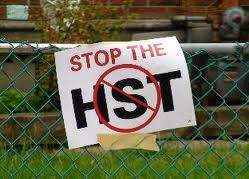COMMENT: Don't blame the Initiative Act for HST fallout
When Elections BC announced the turnout in this summer’s HST referendum, it’s likely a few bottles of champagne were popped. Cheap champagne, but still champagne.
It seemed conventional wisdom was cutting both ways as pundits weighed-in on who would benefit the most from what was seen as a higher than expected turnout: the scrap the tax proponents “ready to crawl over broken glass to vote Yes” or the robo-call team at Smart Tax Alliance.
The broken glass crawlers won out. On Friday, the stickmen put their champagne back in the case.
Nonetheless it remains a sad commentary on the state of BC’s democracy when the HST turnout was seen as a reason for joy because it compared favourably to the number of votes cast in the last provincial election when a record number of British Columbians stayed at home.
Barely one in two registered voters cast a ballot in 2009. Gordon Campbell was re-elected by less than one out of every four voters.
From every perspective, the turnout was an indictment of BC politics.
But with the last HST ballot counted a new debate is gaining some traction. The issue: should ordinary citizens be allowed to have a say on such meaty matters as tax policy?
Opponents to letting citizens vote on anything more significant than a few local zoning changes even have a boogeyman: US-style referenda where No is the operative word when it comes to tax hikes, even in the face of default.
What’s missing from this coffee klatch analysis? BC ain’t Kansas. And when it comes to writing torturous rules for initiative drives, BC takes the cake.
Not surprisingly U.S. state governments built on the premise of “we the people” are far more open to letting citizens have a say.
It’s not so easy in BC, where even property rights aren’t protected under the constitution, as witnessed by the fact that this summer’s referendum was the first ever successful initiative in BC.
While any registered voter can apply to force an initiative, they have 90 days to collect the signatures of ten per cent of the registered voters in every electoral district in BC or roughly 300,000 British Columbians, but only if the question is approved by the Chief Electoral Officer.
To actually win the referendum? Not only does the question need to be passed by 50 per cent plus one of the overall votes cast, but in two-thirds of the province’s electoral districts as well.
Contrast these rules with a recent initiative drive in Ohio.
Earlier this year, unions and their allies in Ohio petitioned to force a referendum on a new law restricting collective bargaining rights for public employees.
Organizers needed 1,000 voters to sign the petition. Once approved by the Secretary of State, they then required the signatures of six per cent of the total vote cast for governor in the last election.
Had similar rules applied in BC – and using the 2009 election as comparable to a state governor’s race – organizers would need 99,000 signatures to force an initiative.
The signatures in Ohio had to be obtained from only half of the state’s 88 counties, not each electoral district as is the case in BC. And from each of these counties, signatures had to represent at least three per cent of that county’s vote for governor.
Organizers required 230,000 signatures out of 8.2 million registered voters. They submitted 915,456 signatures. To win they’ll need 50 per cent plus one of the overall vote.
The bar to forcing an initiative in BC is so high that it’s a miracle there’s even been one referendum.
Don’t be fooled by a few who are now desperately grasping at straws by pointing to the Initiative Act as the culprit for the fiscal mess that the BC government now faces.
It wasn’t in letting British Columbians have a say on the HST that was the problem, but a government that deceived the citizens who elected it; a government that instead of selling its vision, was constantly playing defense.
The entire blame for the HST fiasco – first act to final curtain – rests in the premier’s office: from the deceit of the Campbell government in imposing it to the trickery of Christy Clark’s government in trying to sell it.
By Dermond Travis, the managing director of Integrity BC.
























